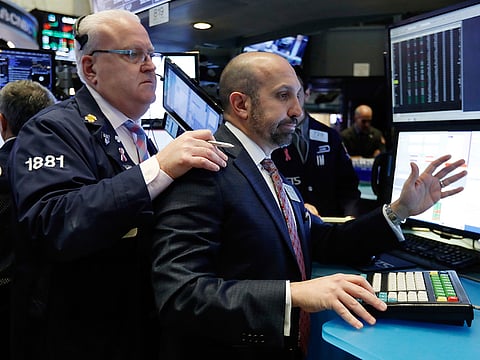Oil finds floor, stocks ease as sterling braces for wild swings
European shares hit two-week low but pare some losses

Milan: Oil prices bounced from multi-month lows on Wednesday but stocks fell as disappointing data heightened worries over slowing global growth, while the pound wavered as Prime Minister Theresa May faced the hard task of selling her Brexit deal.
European shares hit a two-week low after data showed the German economy contracted for the first time since 2015, tracking similar losses in Asia where data in Japan and China underscored worries about weaker growth.
They later pared some losses after reports said Opec and its partners were discussing a proposal to cut output, helping oil prices reverse opening losses and putting an end to their longest losing streak in decades.
The MSCI’s world equity index remained on track for its fifth day of losses in a row, but reduced its decline to 0.1 per cent by 1243 GMT.
The pan-European STOXX benchmark index was down 0.2 per cent, while US stock index futures pointed to a flat open.
Sterling fell from the 7-month high versus the euro and eased below $1.30 (Dh4.77) in volatile trading after being boosted from news that Britain and the European Union agreed on the text of a Brexit divorce deal.
“After 873 days of bickering, point scoring, intransigence on both sides, and seemingly irreconcilable differences, we finally have a deal,” said Deutsche Bank strategist Jim Reid.
“Now this easy part is out of the way along comes the hard part of selling it to a divided Parliament full of vested interests and factions,” he added in a note.
Before seeking UK parliamentary approval before exiting the bloc on March 29, 2019, May will try to persuade senior ministers to accept the deal that opponents said would imperil her own government and threaten national unity.
The British cabinet is due to meet at 1400 GMT.
Although sterling softened from peaks hit in the previous session, investors were anticipating wild swings ahead for the British currency. Sterling/dollar implied overnight volatility jumped to 23 per cent, its highest since a general election in June 2017.
“We are cognisant that the recent provisional deal is only a step in the right direction and if it does not pass the meaningful vote the opposite scenario is likely to play out,” said Richard Larner, Head of Research at Brooks Macdonald.
“In this event, investors will begin to price a no-deal situation into investment markets,” he added.
Oil bounces
Meanwhile, oil attempted to rebound after plunging around 7 per cent the previous session, with surging supply and the spectre of faltering demand scaring off investors.
The growing prospect of Opec and allied producers cutting output at a meeting next month however propped up the market, helping US West Texas Intermediate (WTI) crude futures trade 0.3 per cent at $55.9 a barrel and reverse opening losses.
According to three sources familiar with the issue, Opec and its partners are discussing a proposal to cut oil output by up to 1.4 million barrels per day for 2019, to avert an oversupply that would weaken prices.
In the previous session, US crude futures suffered 12 straight sessions of losses.
“We went through our archives yesterday and found a bit more daily data back to 1977, and we still can’t find a losing run of this magnitude,” said Deutsche Bank’s Reid.
Brent crude oil futures also bounced, up 0.9 per cent, at $66.05 per barrel. In the previous session they hit an eight month low following a 25 per cent slide from the four-year high reached early in October.
Energy stocks in Europe also recovered ground but remained in negative territory, down 0.4 per cent.
The oil plunge underlined cracks in the global economy.
The German economy shrank 0.2 per cent in the third quarter as global trade disputes and problems in the auto industry threw the traditional export growth engine into reverse.
Earlier in the day, data from Japan confirmed the world’s third-largest economy contracted in the third quarter.
Italian budget woes
Still in currency markets, the euro struggled below $1.13 as Italy re-submitted its draft budget for next year to the European Commission with the same growth and deficit assumptions that had been rejected by Brussels.
“While boosting its privatisation plan and committing to mitigate spending overshoots, the Italian government did not change its deficit targets. This will likely lead the European Commission to recommend an infringement procedure,” said Morgan Stanley analysts.
Concerns over the Italian budget also spread to debt markets with yields on Italian government bonds hitting three-week highs, widening the gap over top-rated German peers, while shares in Italian banks fell 1.3 per cent.
In commodities, base metals eased slightly as weak retail sales data from top consumer China took the shine off upbeat industrial output and investment figures in the country.
Sign up for the Daily Briefing
Get the latest news and updates straight to your inbox



